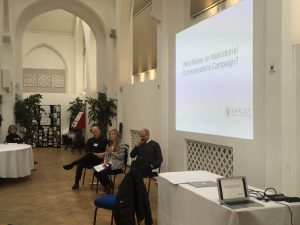The world’s first Community Fridge Network will double in size by the end of 2020 thanks to National Lottery funding, environmental charity Hubbub announced today. Following the success of the first 50 Community Fridges, the charity aims to support the opening of a further 50 sites over the next 22 months.

Founded by Hubbub in July 2017, the Community Fridge Network and fridges within the Network have been funded by backers including The National Lottery Community Fund, Sainsbury’s, The Rothschild Foundation, Bosch, North London Waste Authority, the Morrison’s Foundation, Samsung and the Climate Challenge Fund. The Community Fridge Network launched with the aim of reducing food waste in the UK. Community Fridges provide a place for local residents and businesses to donate surplus food, which is available for anyone in the community to take – with each Fridge on average saving half a tonne of food per month.
As well as reducing food waste, the Fridges encourage a spirit of sharing and can help strengthen community bonds and increase local activities. In a survey of 21 Community Fridges, 50% of Fridges said people are sharing skills, 45% stated their Community Fridge is linked to cooking and growing workshops and 30% said people are sharing other household items.
Food waste remains a huge issue in the UK, with £13 billion of edible food thrown away from our homes every year5 and a further £3 billion of food wasted by the hospitality and food service sector. With the opening of the 50th Community Fridge, the Network is redistributing an average of 25 tonnes of food each month, the equivalent of approximately 50,000 meals.
To celebrate the success of the Community Fridge Network, Hubbub has joined forces with 2013 MasterChef winner, Natalie Coleman who will be visiting Food Academy Community Fridge in Newham on 6th March 2019 to make delicious dishes with the ingredients she discovers there. The recipes will be uploaded to the Hubbub website and social channels after the visit.
Natalie Coleman, 2013 MasterChef winner and chef said: “I am very excited to be part of Hubbub’s campaign as Community Fridges are really helping to tackle and raise awareness of the food waste issue. I have been guilty of throwing food out unnecessarily in the past but since becoming a chef I realise that we can cut down on waste and use it to create new dishes or snacks. I am looking forward to visiting the Community Fridge in Newham where I can share some of my ideas and recipes to turn old ingredients into new exciting dishes.
Trewin Restorick, Founder and CEO, Hubbub said: “We’re thrilled with how successful Community Fridges have been and the rapid growth of the Network. The Fridges not only save valuable food, they help bring people together and have become real community hubs. Some people had doubts at the outset as to whether the Community Fridge Network would work, but the Fridges have developed to be positive, social spaces that have proven the doubters wrong. We’d encourage anyone interested in visiting or opening a Fridge to visit our website and we’d love even more businesses to get involved as demand is outstripping supply in some areas.”
James Harcourt, England Director at The National Lottery Community Fund, said: “Thanks to National Lottery players another 50 Community Fridges are set to open across the UK. We are proud to be supporting Hubbub which gives communities the opportunity to learn new skills, and create a healthier and greener lifestyle together by sharing food and reducing waste. Not only will this strengthen communities, but also enable them to thrive.”
Also known as ‘Solidarity’ or ‘Honesty’ Fridges, Community Fridges have been successfully introduced in Spain, Germany as well as the UK. Hubbub’s Community Fridge Network provides free advice, resources and support to Community Fridge organisers around challenges such as legal requirements and food hygiene, as well as creating opportunities for communities to share experiences and learn from each other.
More information on The Community Fridge Network, including a map of Fridge locations and advice for those interested in setting up a Community Fridge can be found at https://www.hubbub.org.uk/the-community-fridge.









 Barley’s Laura Harrison was delighted to join with speakers from Sainsbury’s and others today at a Discovery Communities event at the Custard Factory in the heart of Birmingham’s creative quarter.
Barley’s Laura Harrison was delighted to join with speakers from Sainsbury’s and others today at a Discovery Communities event at the Custard Factory in the heart of Birmingham’s creative quarter. Wow, what a week we’ve had! On Wednesday we launched new research from
Wow, what a week we’ve had! On Wednesday we launched new research from 
 Communicating clear messages to tackle obesity seems to be getting harder. Witness May this year when the National Obesity Forum published a report which backed eating more fat. Dr Aseem Malhotra called for a change in message advocating: “eat fat to get slim, don’t fear fat, fat is your friend.” The result? Four Forum members resigned and the
Communicating clear messages to tackle obesity seems to be getting harder. Witness May this year when the National Obesity Forum published a report which backed eating more fat. Dr Aseem Malhotra called for a change in message advocating: “eat fat to get slim, don’t fear fat, fat is your friend.” The result? Four Forum members resigned and the  Today we’re delighted to launch #CookSomethingGrand with Hubbub and Unilever, the latest in a series of seasonal campaigns to tackle food waste in the home as part of their Joint Ambition for a Zero Food Waste Britain.
Today we’re delighted to launch #CookSomethingGrand with Hubbub and Unilever, the latest in a series of seasonal campaigns to tackle food waste in the home as part of their Joint Ambition for a Zero Food Waste Britain. A guest blog by Barley Partner, Sam Williams for Jamie’s Food Revolution on food, gender and healthy communication with children.
A guest blog by Barley Partner, Sam Williams for Jamie’s Food Revolution on food, gender and healthy communication with children.